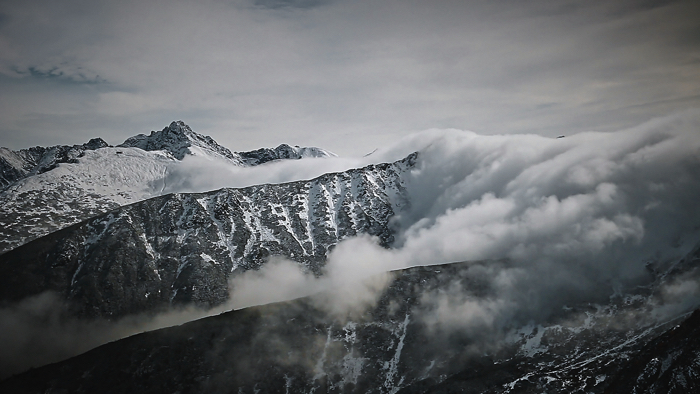
Dir.: Michal Bielawski; Documentary; Poland/Slovakia 2019, 74 min.
This poetic essay plays out like a thriller set in the mountain region of Podhale in southern Poland. Although the Tatra mountains are well known as a paradise for winter sports, Bielawski focuses on the cruel and unpredicable natural phenomenon of the ‘halny’ winds. These often terrorise locals but also cause rapid changes in atmospheric pressure strongly influencing the wellbeing of both people and animals and wreaking havoc with their habitat. Bielawski shows how the communities organise themselves to fight back.
A poetess, a female ambulance driver and old farmer, all unnamed, are the main protagonists of this tour de force eco-doc. The farmer is trying to batten down the barn hatches where a cow has just given birth to a baby bull. The storm is so strong that only planks nailed to the door will prevent them blowing open by the strength of the wind. Meanwhile the ambulance paramedic takes a call from a gentleman who says he wants to report a suicide. “Yours, or someone else’s” she asks him. “Mine” comes the strange reply. She remembers a long journey to a town far away where she had to deal with the corpse of a person hanged for his crimes. Meanwhile, the poetess emerges as the one most ‘in tune’ with the wind’s forces. A very fit woman in her fifties, she enjoys reciting her verses in the woods, hugging the trees, many of which have been felled in the recent storms.
The film then tracks back to the farmer who, with his friends, erects a small pylon, later fitting it with a windmill. The farmer and some children decide to go up to the mountain on the cable car, but the old man starts to feels sick. He later visits a doctor, who runs an ECG. Far away, we see a Ferris wheel, like a fata morgana. The poetess collects wood from a fallen tree, she saws it in little pieces and tells the forester she wants to buy a small part of the woods. The ambulance driver meanwhile deals with a drunkard and a victim of epilepsy, while his colleague fails to resuscitate a patient. The poetess sings in the woods where the snow storm is blowing a gale, trees are blocking the road, the windmills are devastated and a fire breaks out in the farmhouse, spreading to the barn and killing two cows before he can open the door. After the storm, the poetess saws off a piece of a fallen tree, takes out a piece of paper, and writes a new poem on the tree. Meanwhile, the old farmer, repairs the windmill as the children watch on.
Bielawski develops an elliptical rhythm as humans permanently try to mend what nature has destroyed. But ironically they don’t blame the storm, or even think of leaving the area: they have accepted their lot, but go on loving the mountains. DoP Bartek Solik’s fly on the wall images, particularly the close-ups, show us a rich emotional life. Most impressive is the poetess who is happy to be a witness to the living and the dead, animal and nature. A unique study of how an ongoing struggle has strangely becomes a rewarding way of life. AS
VISIONS DU REEL | 5-13 APRIL 2019